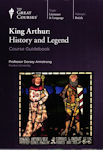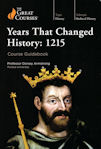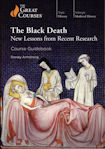This is the course guidebook that accompanies the 24 lecture “Great Course” of the same name. It is essentially an abbreviated transcript of each 30 minute lecture, a few pictures, some suggested reading, and a few questions to think about. (I watched the lectures, which is what I am reviewing here, and am using the book simply as an aide-memoire.)
Armstrong covers the entirety of the Arthurian legends, from their possible historical origins, through the medieval beginnings, to the Victorian revival, onto the present day multi-media re-imaginings.
I now understand why I have known quite a lot of the stories, but was always a bit foggy on the overall way things fit together. They don’t. It’s essentially all made up, by multiple authors over several centuries and cultures, for a variety of political and artistic reasons, with little attention to continuity or worry about contradiction. Certain well known components, like the Grail, appear surprisingly late. Others, like Tristan and Isolde, have been grafted in from separate origins. All this means that Monty Python and the Holy Grail is just as much canon as is Le Morte Darthur or Idylls of the King.
This is the third set of Armstrong’s lectures I’ve watched, all equally fascinating and excellently presented. It turns out I have watched them in reverse order of publication (2022, then 2019, and here 2015). So I’ve watched Armstrong grow younger through time, a bit like Merlin in The Once and Future King, I suppose.


